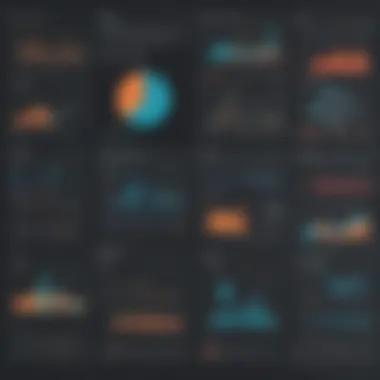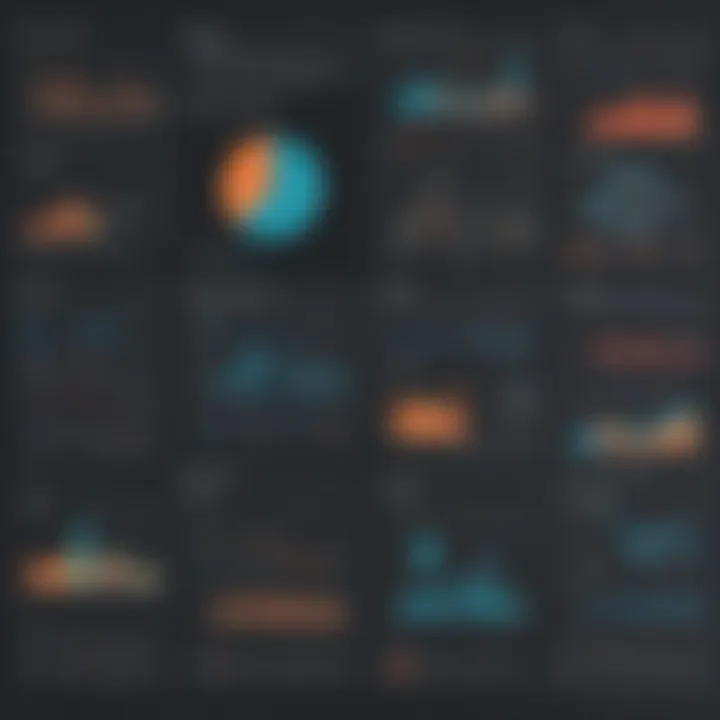Unveiling the Top Books Every Data Scientist Must Explore for In-depth Knowledge


App Overview
In the realm of data science, where knowledge is power and insights drive decision-making, a curated selection of books can serve as beacons of wisdom for both novice and seasoned practitioners. These literary treasures not only elucidate fundamental concepts but also unveil cutting-edge strategies that propel data scientists to the pinnacle of their craft. By embarking on an exploratory journey through the best books for data scientists, individuals can enrich their understanding, hone their skills, and navigate the intricate landscape of data analytics with confidence and finesse.
Step-by-Step Exploration
As we venture into the realm of essential books for data scientists, a systematic approach is paramount. To begin, we shall unravel the foundational texts that lay the bedrock of data science principles. Delving into these books equips individuals with a solid understanding of statistical analysis, machine learning algorithms, and data visualization techniques. Subsequently, we will ascend towards more advanced literature, delving into complex topics such as deep learning, neural networks, and artificial intelligence. Each step of our exploration will unveil new perspectives, deepen our expertise, and sculpt us into well-rounded data science aficionados.
Insights and Expertise
Within the pages of these treasured volumes lie not just knowledge but invaluable pearls of wisdom bestowed upon us by trailblazers in the field. Expert tips and strategies peppered throughout the text illuminate pathways to optimization, innovation, and problem-solving. Uncovering hidden features and shortcuts tucked away in these literary gems unveils new dimensions of efficiency and efficacy in data analysis. As we absorb the insights and expertise offered by these books, we transcend beyond mere practitioners to visionaries in the realm of data science.
Challenges and Solutions
Yet, no journey is without its obstacles. Alongside the vast expanse of knowledge and insights lie the pitfalls of confusion, setbacks, and challenges. By foreseeing common issues that data scientists may encounter in their pursuit of excellence, we equip ourselves with the armor of knowledge and the sword of troubleshooting techniques. Each challenge becomes an opportunity for growth, each problem a puzzle waiting to be solved. Through a thorough exploration of potential stumbling blocks and their solutions, we emerge stronger, wiser, and more resilient in the face of adversity.
Comparative Analysis
In the sea of literature dedicated to data science, each book serves as a unique beacon of knowledge, illuminating the path for eager learners and seasoned professionals alike. Comparing and contrasting these literary marvels allows us to discern the unique selling points, intricate nuances, and distinctive features that set each book apart. By engaging in a critical appraisal of these works, we not only enrich our understanding of data science but also elevate our discernment, enabling us to cherry-pick the texts that resonate most profoundly with our goals and aspirations in the realm of data analytics.
Introduction
Books play a crucial role in the development and advancement of data scientists, serving as invaluable resources for expanding knowledge and honing expertise within the field. In this article, we delve into an in-depth exploration of the best books tailored for data scientists. These meticulously curated selections cover a wide spectrum of topics, ranging from foundational principles to cutting-edge advancements. By examining the significance and impact of these books, aspiring and seasoned data scientists alike can gain profound insights and practical wisdom, enhancing their skills and capabilities in the ever-evolving landscape of data science.
The Importance of Books in Data Science
The significance of books in the realm of data science cannot be overstated. They serve as the building blocks upon which individuals construct their understanding of complex concepts and methodologies. Books provide a comprehensive repository of knowledge, offering detailed explanations, examples, and case studies that allow readers to deepen their comprehension and practical application of data science principles. By immersing oneself in carefully selected books, data scientists can expand their expertise, stay abreast of industry trends, and continuously enhance their problem-solving skills. These resources not only nurture intellectual growth but also foster a culture of ongoing learning and innovation within the data science community.


Purpose of Curating Data Scientist Books
The curation of data scientist books serves a dual purpose - to offer a structured pathway for individuals entering the field and to empower experienced professionals with specialized insights. By curating a selection of books that cover a broad spectrum of topics, ranging from introductory concepts to advanced techniques, this process aims to cater to the diverse needs and interests of readers at different stages of their data science journey. Through thoughtful selection and organization, these curated books provide a roadmap for continuous learning and skill development, enabling data scientists to navigate complex challenges, explore new horizons, and synergize theoretical knowledge with real-world applications. Overall, the purpose of curating data scientist books is to facilitate knowledge acquisition, foster critical thinking, and inspire innovation within the dynamic domain of data science.
Foundational Books
In the realm of Data Science, foundational books play a pivotal role in shaping the understanding and knowledge base of individuals venturing into this field. These books serve as the building blocks, laying a solid groundwork for both beginners and seasoned professionals alike. By delving into foundational concepts, readers can grasp essential theories, methodologies, and practices that form the backbone of data science operations. Understanding these fundamental principles is critical for mastering advanced topics and leveraging cutting-edge techniques in this rapidly evolving field.
Data Science for Beginners
1. 'Python for Data Analysis' by Wes McKinney
'Python for Data Analysis' by Wes McKinney holds a significant position in the literature for novice data scientists as it pioneers the application of Python programming language specifically tailored for data analysis tasks. This book offers a comprehensive guide to utilizing Python libraries efficiently in the context of data manipulation, visualization, and exploration, making it an indispensable resource for data science enthusiasts. The key characteristic of 'Python for Data Analysis' lies in its user-friendly approach, allowing beginners to grasp complex data analysis concepts with relative ease. Its clear explanations and practical examples forge a direct connection between theoretical knowledge and real-world applications, accelerating the learning curve and enhancing comprehension. While its step-by-step instructions are advantageous for beginners, its limited coverage of advanced topics may be considered a drawback in more specialized contexts.
2. 'Data Science for Business' by Foster Provost and Tom Fawcett
'Data Science for Business' by Foster Provost and Tom Fawcett emerges as a vital resource bridging the gap between data science and business domains, catering to aspiring data scientists aiming to understand the practical implications of analytics in organizational settings. This book highlights the fusion of data analysis techniques with strategic decision-making processes, offering a holistic perspective on utilizing data-driven insights to drive business growth and innovation. An advantageous characteristic of 'Data Science for Business' is its emphasis on translating complex analytical findings into actionable recommendations for stakeholders, fostering a strategic alignment between data science initiatives and business objectives. However, its focus on managerial applications may limit its relevance for technical professionals seeking in-depth technical insights.
Statistics and Probability
1. 'The Art of Statistics' by David Spiegelhalter
'The Art of Statistics' by David Spiegelhalter stands out as an indispensable guide for data scientists venturing into statistical analysis, providing a comprehensive overview of statistical methodologies and their applications in diverse domains. The key characteristic of this book lies in its ability to elucidate complex statistical concepts using intuitive explanations and real-world examples, making statistical theory accessible to individuals with varying levels of expertise. Its emphasis on practical usage scenarios and decision-making processes equips readers with the analytical tools needed to derive meaningful insights from data, enhancing their capabilities in statistical reasoning and inference. Despite its comprehensive coverage of statistical topics, 'The Art of Statistics' may present challenges for beginners due to the intricate nature of statistical theories explored.
2. 'Think Bayes' by Allen B. Downey
'Think Bayes' by Allen B. Downey offers a unique perspective on Bayesian statistics, focusing on probabilistic reasoning and inference methods essential for data scientists engaging in predictive modeling and decision-making processes. By incorporating Bayesian principles into data analysis workflows, this book empowers readers to make informed probabilistic assessments and forecast outcomes based on limited information. The key characteristic of 'Think Bayes' resides in its practical approach to Bayesian statistics, emphasizing hands-on applications and algorithmic implementations to reinforce conceptual understanding. Its emphasis on using Bayesian techniques to solve real-world problems enhances the relevance and applicability of Bayesian statistics in data science contexts. However, the steep learning curve associated with Bayesian concepts may pose a challenge for individuals new to probabilistic reasoning.


Advanced Topics
To delve into the best books for data scientists, it is vital to explore advanced topics within the realm of data science. These topics encompass cutting-edge techniques and methodologies that are crucial for professionals in this field. By delving into advanced topics, data scientists can stay ahead of the curve and gain a deeper understanding of complex concepts and technologies. Understanding advanced topics not only enhances one's expertise but also fosters innovation and problem-solving skills, making it a cornerstone of any data scientist's knowledge.
Machine Learning and AI
In the realm of data science, 'Hands-On Machine Learning with Scikit-Learn, Keras, and TensorFlow' by Aurélien Géron plays a pivotal role in providing practitioners with practical insights and hands-on experience in machine learning. This book not only discusses fundamental machine learning algorithms but also delves into real-world applications using popular libraries like Scikit-Learn, Keras, and TensorFlow. By focusing on practical implementation and coding exercises, this book equips data scientists with the necessary tools to tackle complex machine learning tasks effectively.
Melanie Mitchell's 'Artificial Intelligence: A Guide for Thinking Humans' offers a comprehensive overview of artificial intelligence, catering to both beginners and seasoned professionals. The book bridges the gap between AI concepts and human cognition, providing readers with a profound understanding of how AI systems operate and make decisions. Mitchell's approach combines technical knowledge with cognitive science, offering a unique perspective on artificial intelligence that is both enlightening and accessible to a diverse audience.
Big Data and Data Mining
'Mining of Massive Datasets' by Jure Leskovec, Anand Rajaraman, and Jeff Ullman serves as a critical resource for data scientists navigating the complexities of big data and data mining. This book delves into advanced algorithms and techniques for analyzing massive datasets efficiently, making it an indispensable guide for professionals working with extensive data sets. By presenting scalable solutions and real-world examples, this book empowers data scientists to extract valuable insights from large volumes of data with precision and accuracy.
'Big Data: A Revolution That Will Transform How We Live, Work, and Think' by Viktor Mayer-Schönberger and Kenneth Cukier delves into the transformative power of big data and its profound impact on various industries. From innovative business practices to societal implications, this book explores the opportunities and challenges presented by the big data revolution. By highlighting real-world case studies and future trends, the book offers a comprehensive outlook on how big data is reshaping our world and influencing decision-making processes.
Specialized Areas
When delving into the realm of data science literature, it is imperative to acknowledge the significance of specialized areas. These specialized areas offer in-depth knowledge and expertise in specific niches within the data science domain. By focusing on specialized areas such as Natural Language Processing (NLP) and Data Visualization, data scientists can gain a deep understanding of complex concepts and tools that are crucial for advanced analysis and interpretation of data. Specialized areas provide a pathway for professionals to hone their skills and stay abreast of the latest developments in these specialized fields.
Natural Language Processing
1. 'Speech and Language Processing' by Daniel Jurafsky and James H. Martin
Exploring the intricate world of 'Speech and Language Processing' by Daniel Jurafsky and James H. Martin unveils a treasure trove of insights into the nuances of human language comprehension by machines. This seminal work contributes significantly to the field of NLP, offering a comprehensive guide to understanding how computers can process and analyze human language. The key characteristic of this book lies in its lucid explanations and practical examples that demystify complex NLP algorithms and techniques. 'Speech and Language Processing' stands out as a revered choice for data scientists due to its meticulous approach to NLP concepts and its practical utility in real-world applications. The unique feature of this book is its blend of theory and hands-on exercises, providing readers with a holistic learning experience. While the book offers invaluable knowledge in NLP, some readers may find its dense technical content challenging to decipher, requiring a solid foundation in NLP fundamentals to grasp its complex concepts.
2. 'Natural Language Processing in Action' by Lane, Howard, and Hapke


Diving into 'Natural Language Processing in Action' by Lane, Howard, and Hapke unveils a hands-on approach to mastering NLP techniques in practical scenarios. This book contributes to the overall goal of enhancing NLP skills by providing real-world examples and case studies that showcase the application of NLP algorithms. The key characteristic of this book lies in its emphasis on implementing NLP solutions in various domains, ranging from social media analysis to sentiment analysis. 'Natural Language Processing in Action' emerges as a favored choice for data scientists due to its focus on applying NLP concepts to solve tangible problems encountered in data science projects. The unique feature of this book is its accessible writing style and code snippets that simplify complex NLP algorithms for readers at all skill levels. While the book excels in its practical approach, some readers may find its hands-on exercises limited in scope, necessitating further exploration of advanced NLP concepts for comprehensive expertise.
Data Visualization
1. 'The Visual Display of Quantitative Information' by Edward Tufte
Embarking on a journey through 'The Visual Display of Quantitative Information' by Edward Tufte unravels the art and science of data visualization, offering profound insights into the creation of effective visual representations of data. This book contributes significantly to the overall goal of fostering a clear understanding of how data can be visually communicated for interpretative purposes. The key characteristic of this book lies in its emphasis on simplicity and clarity in data visualization, advocating for minimalist design principles that enhance data comprehension. 'The Visual Display of Quantitative Information' earns its place in this article as a distinguished choice for data scientists due to its timeless advice on creating informative and visually appealing data displays. The unique feature of this book is its critique of common data visualization pitfalls and its emphasis on maximizing data-ink efficiency for impactful visual communication. While the book excels in advocating for effective data visualization practices, some readers may find its design principles rigid, requiring flexibility in adapting visual techniques to diverse data presentation requirements.
2. 'Data Points: Visualization That Means Something' by Nathan Yau
Engaging with 'Data Points: Visualization That Means Something' by Nathan Yau introduces readers to a fresh perspective on data visualization that prioritizes meaningful insights over aesthetic appeal. This book contributes to the overarching goal of creating data visualizations that tell compelling stories and convey actionable insights. The key characteristic of this book lies in its focus on the narrative power of visualizations, encouraging data scientists to craft visual stories that resonate with audiences and drive decision-making. 'Data Points: Visualization That Means Something' is a standout choice for data scientists due to its emphasis on connecting data points to real-world implications, fostering a deeper understanding of the data being presented. The unique feature of this book is its emphasis on storytelling through data visualizations and its practical guidance on designing impactful visual narratives. While the book excels in its narrative-driven approach to data visualization, some readers may find its storytelling emphasis detracting from traditional data visualization aesthetics, necessitating a balance between narrative engagement and data clarity for effective visualization practices.
Case Studies and Practical Applications
In the realm of data science, practical applications and case studies serve as crucial components in bridging theoretical concepts with real-world scenarios. Understanding the tangible implications of data analysis is paramount in honing one's skills as a data scientist. Case studies offer a unique opportunity to explore the practical implementation of various methodologies and techniques discussed in data science literature. By delving into real-world projects and their outcomes, aspiring data scientists can gain invaluable insights into the challenges and successes encountered in the field. Moreover, practical applications allow individuals to test their comprehension and adaptability by applying learned principles to actual datasets and business problems. This section promises to elucidate the significance of case studies and practical applications in enriching the learning journey of data scientists.
Real-World Insights
'Data Science for Social Good' by Rayid Ghani, Jake Porway, and DJ Patil:
'Data Science for Social Good' by Rayid Ghani, Jake Porway, and DJ Patil encapsulates the essence of utilizing data science for benevolent purposes. This book exemplifies how data analytics can be leveraged to solve societal issues, drive positive change, and aid in humanitarian efforts. Its emphasis on the ethical and socially responsible use of data sets it apart as a beacon of integrity in the data science domain. The unique aspect of this book lies in its ability to inspire data scientists to apply their expertise towards creating a meaningful impact on communities and societies. 'Data Science for Social Good' stands out as a commendable choice for this article due to its commendable narrative style, practical examples, and actionable insights that resonate with the overarching theme of utilizing data for the betterment of society.
'Storytelling with Data' by Cole Nussbaumer Knaflic:
'Storytelling with Data' by Cole Nussbaumer Knaflic presents a compelling approach to data presentation and visualization. This book focuses on the art of crafting narratives through data, enabling data scientists to communicate their findings effectively to various stakeholders. The key strength of this book lies in its ability to transform complex data sets into coherent and engaging stories that facilitate decision-making and understanding. In the context of this article, 'Storytelling with Data' is a favored choice for its emphasis on the importance of communication in data science initiatives. The book's distinct feature of blending data analysis with storytelling techniques offers a valuable asset for data scientists seeking to convey their insights persuasively and compellingly.
Ethical Considerations
'Weapons of Math Destruction' by Cathy O'Neil:
'Weapons of Math Destruction' by Cathy O'Neil delves into the ethical implications of algorithms and mathematical models in various societal domains. The book sheds light on the potential misuse of data science techniques, which can inadvertently perpetuate biases and inequalities. Its critical analysis of the ethical dilemmas inherent in data-driven decision-making prompts readers to reflect on the larger consequences of their analytical choices. With a focus on transparency, accountability, and fairness, 'Weapons of Math Destruction' serves as a thought-provoking selection for this article. Its distinctive feature lies in its ability to challenge conventional notions of objectivity in data analysis, urging data scientists to adopt a more conscientious and ethical approach in their practices.
'Ethics of Big Data' by Kord Davis and Doug Patterson:
'Ethics of Big Data' by Kord Davis and Doug Patterson explores the ethical challenges entwined with the vast volumes of data encompassing big data analytics. The book navigates through intricate discussions on privacy, consent, and social implications of data collection and utilization. Its contribution to the discourse on data ethics is pivotal in guiding data scientists towards principled decision-making and responsible data stewardship. By highlighting the ethical frameworks and considerations crucial in the era of big data, this book carves a path for ethical reflection and action within the data science community. Its distinguishing factor lies in its comprehensive approach to addressing ethical dilemmas specific to the era of ubiquitous data, making it a pertinent choice for inclusion in this article.







